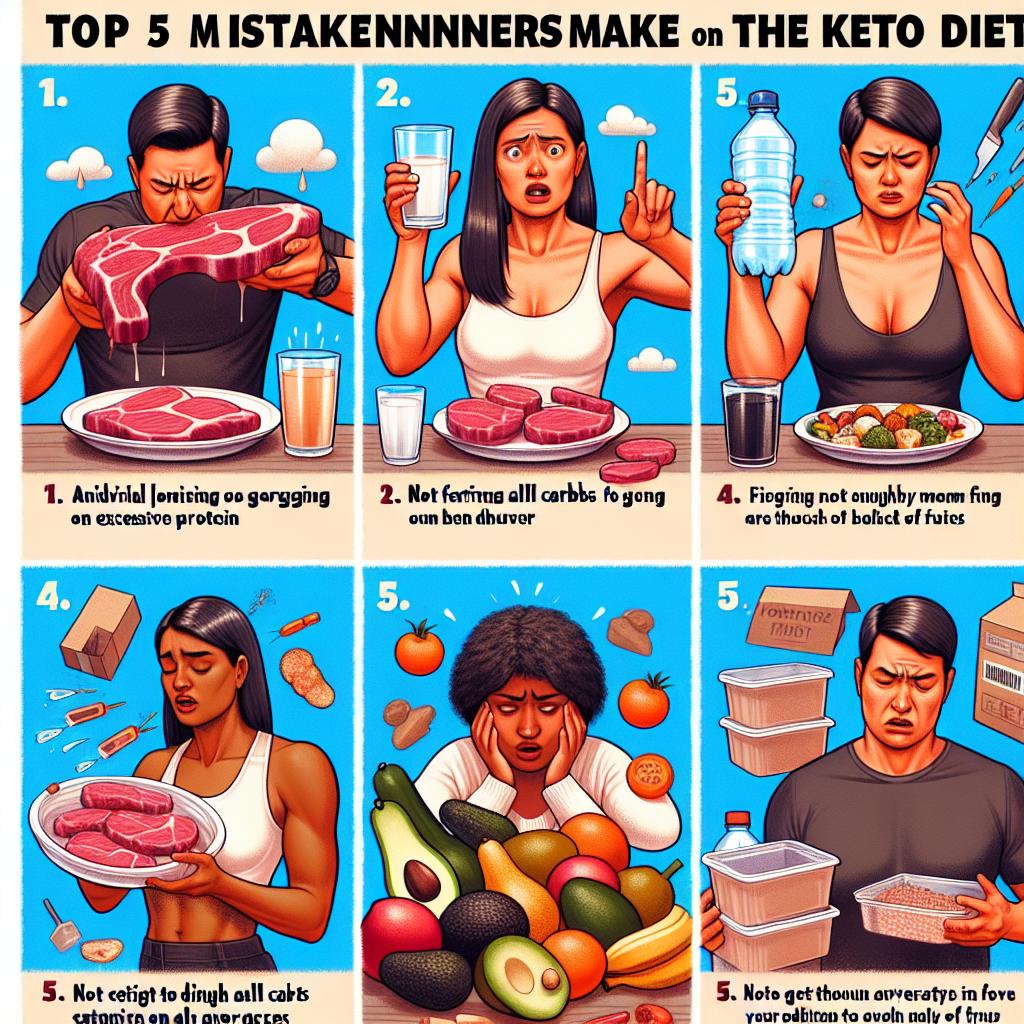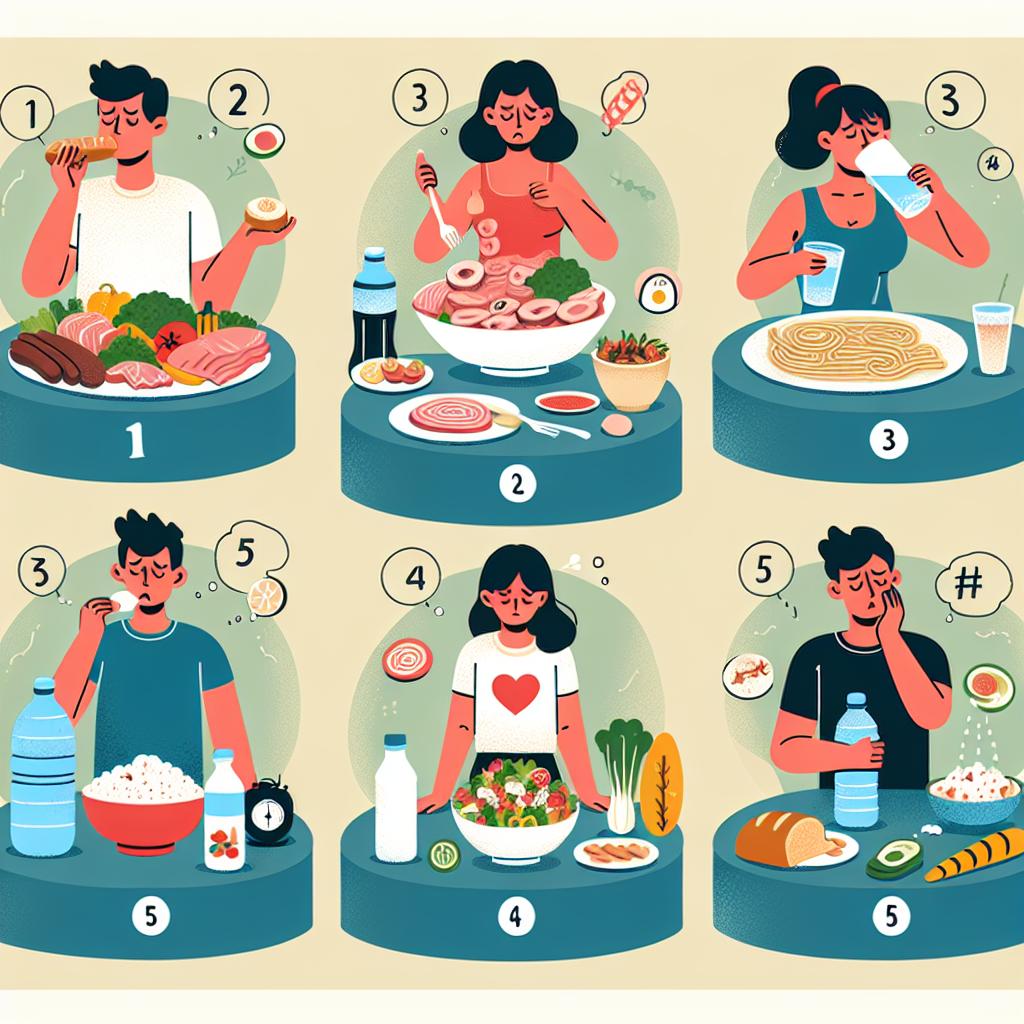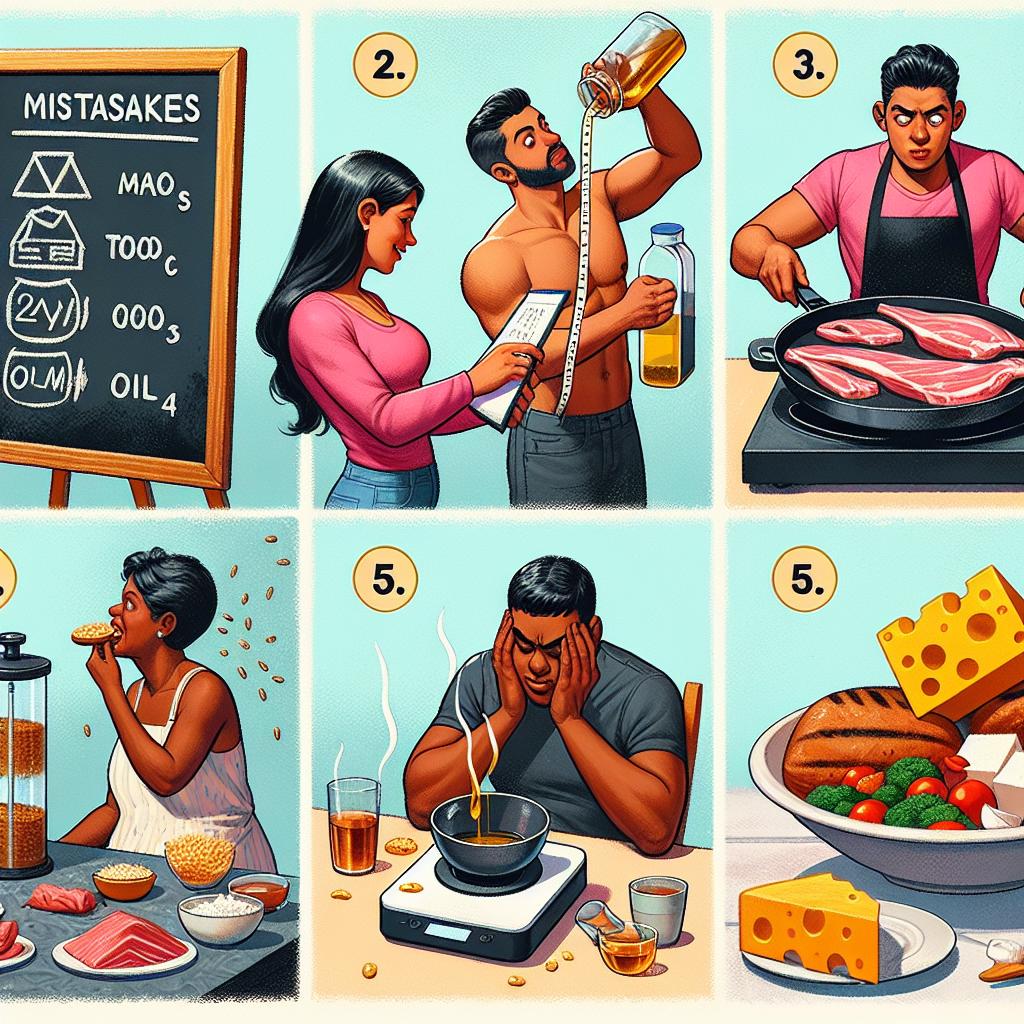This post may contain affiliate links which means I may receive a commission for purchases made through links. Learn more on my Private Policy page.
Introduction:
Embarking on a new diet can feel a bit like setting sail on uncharted waters, especially when that diet is the popular ketogenic lifestyle. While the promise of deliciously creamy avocados, crispy bacon, and satisfying cheese is enough to make anyone’s taste buds tingle with excitement, the keto journey isn’t always smooth sailing. For beginners, the road can be a minefield of common missteps that can quickly turn the thrill of ketosis into a confusion of cravings and dietary doubts. Fear not, intrepid explorers! In this friendly guide, we’ll navigate through the top five mistakes that newcomers often make on the keto diet. With a sprinkle of humor and a dash of helpful insights, we’ll ensure you’re equipped for a successful and enjoyable voyage into the world of low-carb living. So grab your favorite keto snack, settle in, and let’s chart a course to a keto success story!
Understanding the Keto Basics and Avoiding Misconceptions
The ketogenic diet, often simply referred to as keto, is a low-carb, high-fat eating plan that has gained significant popularity for its potential weight loss and health benefits. However, with its rise in popularity, numerous misconceptions have surfaced that can lead beginners astray. One common belief is that all fats are created equal; however, not all fats nourish the body in the same way. It’s crucial to differentiate between healthy fats—like those from avocados, olive oil, and nuts—and unhealthy trans fats commonly found in processed foods. Embracing healthy fats while minimizing sugar and grains is key to making keto effective.
Another frequent misunderstanding is the idea that a ketogenic diet means unlimited eating of high-fat foods without any attention to portions or overall calorie intake. While keto allows higher fat consumption, being conscious of portion sizes can prevent unwanted weight gain. Additionally, many beginners think that they can enjoy any kind of low-carb food without checking its total carbohydrate content, missing hidden carbs in sauces, processed foods, or even certain vegetables. To navigate these pitfalls successfully, keep these essential tips in mind:
- Focus on whole, unprocessed foods.
- Monitor your daily carb intake closely.
- Stay hydrated and mindful of electrolyte balance.
- Don’t neglect protein; balance is key.
Common Carb Counting Pitfalls and How to Tackle Them
One of the most common missteps for those new to carb counting is underestimating the impact of hidden carbs. Many assume that if a food item is labeled as “low-carb,” it’s safe to indulge without a second thought. However, ingredients like sauces, condiments, and even certain vegetables can pack a surprising carbohydrate punch. To avoid this pitfall, make it a habit to read the nutrition labels carefully and consider using a food diary or tracking app. This practice not only helps you stay accountable but also gives you a clearer picture of your daily intake.
Another frequent mistake is not adjusting portion sizes appropriately. Beginners might find it difficult to gauge how much is too much, inadvertently leading to higher carb consumption than intended. It’s essential to invest in a kitchen scale and familiarize yourself with standard serving sizes. Break it down by categorizing foods:
| Food Type | Typical Serving Size | Net Carbs |
|---|---|---|
| Leafy Greens | 1 cup | 1-2g |
| Nuts | 1 oz | 4-6g |
| Berries | 1/2 cup | 6-8g |
By understanding the typical serving sizes and their net carbs, you can develop a more intuitive sense for what fits into your daily macro goals. Additionally, tracking progress beyond just carbs—like how you feel, energy levels, and weight loss—can keep you motivated and centered on your ketogenic journey.

The Importance of Balanced Nutrition for Sustainable Success
When embarking on a new dietary approach like the keto diet, maintaining balanced nutrition is essential for long-term success. Many beginners make the mistake of focusing solely on macronutrient ratios, often at the expense of overall nutritional quality. This oversight can lead to deficiencies and unwanted side effects, which may derail their commitment to the lifestyle. To truly thrive, it’s important to incorporate a wide variety of nutrient-dense foods. Here are a few key aspects to consider:
- Diversity in Vegetables: Always aim for an array of colors on your plate, as this ensures a broader spectrum of vitamins and minerals.
- Quality Fats: Opt for healthy sources like avocados, nuts, and olive oil rather than processed fats.
- Mindful Eating: Pay attention to portion sizes and listen to your body’s hunger signals to avoid overeating.
Another common pitfall is neglecting hydration and electrolyte balance, which can lead to feelings of fatigue or dizziness known as the “keto flu.” It’s crucial to consume adequate fluids and consider replenishing essential electrolytes like sodium, potassium, and magnesium. A simple guide to electrolyte-rich foods includes:
| Electrolyte | Rich Food Sources |
|---|---|
| Sodium | Sea salt, bone broth |
| Potassium | Spinach, avocados |
| Magnesium | Nuts, seeds, dark chocolate |
By prioritizing balanced nutrition and being mindful of these critical components, beginners can create a more sustainable and enjoyable keto journey. This will not only support their dietary goals but also enhance their overall well-being and energy levels as they progress.

Hydration and Electrolytes: Key Components Often Overlooked
When embarking on a ketogenic diet, many beginners focus heavily on macronutrients, often neglecting the importance of hydration and electrolytes. Proper hydration is crucial, as the body starts to flush out excess water when carbohydrates are significantly reduced. This shift can lead to quicker loss of water weight, but it can also result in dehydration if one isn’t consuming enough fluids. To maintain optimal hydration, consider drinking plenty of water and incorporating foods with high water content such as leafy greens and cucumbers. Staying hydrated supports overall health, boosts energy levels, and can even help mitigate feelings of fatigue often experienced during the initial stages of the diet.
Moreover, electrolytes—such as sodium, potassium, and magnesium—play a vital role in maintaining balance in your body, especially when on a low-carb diet. When carb intake drops, insulin levels decrease, leading to increased sodium excretion. This can create an imbalance that contributes to symptoms often referred to as the “keto flu.” To counteract this, it’s essential to replenish these electrolytes. You can achieve this through a combination of dietary sources and supplementation. Here’s a quick overview:
| Electrolyte | Sources |
|---|---|
| Sodium | Salt, broths, pickles |
| Potassium | Avocados, spinach, mushrooms |
| Magnesium | Nuts, seeds, dark chocolate |
Incorporating these simple strategies into your routine can enhance your keto experience, helping you avoid common pitfalls and enjoy a more vibrant journey towards your health goals.
Q&A
Q&A: Top 5 Mistakes Beginners Make on the Keto Diet
Q: What’s the number one mistake beginners make when starting the Keto diet?
A: Ah, the classic carb conundrum! Many newbies underestimate the impact of hidden carbs lurking in their favorite foods. Thinking they can just cut bread and pasta while loading up on other carbs can derail their efforts. Tip: Always check labels and measure portions. Remember, on keto, less is more when it comes to carbs!
Q: I’ve heard fat is supposed to be my friend on Keto. Is that true?
A: Absolutely! But here’s the kicker: not all fats are created equal. A common mistake is diving headfirst into unhealthy fats, like trans fats and excess processed oils. Focus on wholesome, healthy fats from sources like avocados, nuts, olive oil, and fatty fish. Your body will thank you!
Q: What about tracking macros? Do I really need to do that?
A: Great question! Beginners often think they can just wing it with the Keto diet, but many end up losing steam because they aren’t getting the right ratios of fat, protein, and carbs. Tracking your macros can feel tedious, but it’s crucial for hitting that sweet spot. Consider it like tuning a musical instrument—when you get it right, the results can be music to your ears!
Q: Is it normal to feel sluggish when starting Keto?
A: Oh, the infamous “keto flu!” Many beginners expect to feel like superheroes overnight but end up feeling fatigued instead. This may happen if you cut carbs too quickly without preparing your body. Hydration is key—make sure you’re drinking plenty of water and replenishing electrolytes. Cultivate patience, and soon you’ll be the hero in your own Keto saga!
Q: What’s the biggest social pitfall for Keto newbies?
A: Social settings can be tricky for those on Keto. Many beginners make the mistake of skipping events or feeling deprived while watching others indulge—talk about a mood killer! Instead, have a game plan. Bring your own snacks, and don’t be shy about asking the host for alternatives. Remember, the Keto lifestyle can be flexible and fun—socializing doesn’t have to be off-limits!
By keeping these common mistakes in mind, you’ll sail smoothly on your Keto adventure! Happy eating, and welcome to your new lifestyle!
Insights and Conclusions
As we wrap up our exploration of the top 5 mistakes beginners make on the keto diet, remember that every journey has its bumps along the way! Embracing this low-carb lifestyle can be both exciting and challenging, but learning from these common pitfalls can help you navigate your path with confidence and ease.
As you dive into the delicious world of avocados, butter, and almond flour, keep in mind that every misstep is simply a stepping stone toward success. With a sprinkle of patience, a dash of creativity, and a healthy dose of self-compassion, you’ll soon find your keto groove.
So, whether you’re sipping your bulletproof coffee or preparing a cauliflower pizza, remember to enjoy the ride! Your body will thank you, and soon, the keto diet may just become your favorite culinary adventure. Until next time, happy keto-ing! 🍳🥑✨

